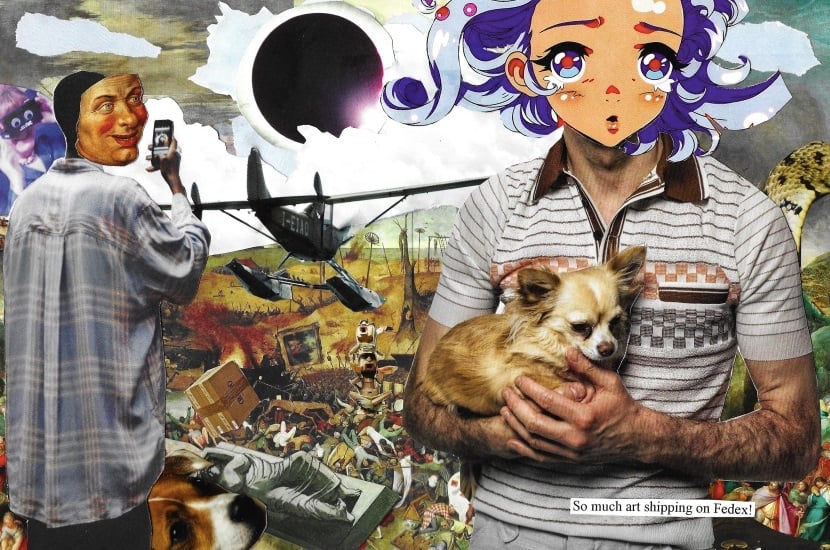
Collage made by Chris Collier as part of an AfterHours Collage Workshop, May 2019.
A welcoming space for affordable training
The lack of affordable skills-based training and opportunities to learn from others makes it much harder for people from disadvantaged backgrounds to develop their careers in the arts. Simina Neagu and Valentina Bin took action to fill the gap.
The experiences and skills needed for entry-level jobs in the arts are often intimidating and seldom reflected in pay. Jobs paying just the living wage in London may require curating and commissioning experience, as well as a proven track record in fundraising, yet application packs constantly encourage people from disadvantaged backgrounds to apply. This often seems unrealistic and hypocritical in light of these requirements.
Progress has been made in recent years, especially in terms of paid internships, but there’s a lot of work to do to improve access and make the arts sector more representative of UK society.
Part of the problem is the gap within higher education for skills-based training for arts workers. While a range of different educational opportunities exist for artists and curators, there are very few convivial, peer-led spaces for aspiring and practising arts workers to meet, discuss and learn from each other’s experiences.
The secret to a successful workshop is to create a welcoming space
Filling the gap
The AfterHours project started because we craved an alternative to costly and inaccessible courses. As highlighted in ‘Panic!’, the first report on social mobility in the cultural industries, socio-economic factors are an important determinant of confidence. The aim of AfterHours is to help people gain confidence by acquiring skills, understanding their rights, getting advice from peers and feeling part of a community of arts workers facing similar issues.
We were inspired by participating in a feminist reading group run by immigrant women and non-binary people working in visual arts, publishing and academia. As immigrants ourselves, we are very aware of the need for a support network.
When the contemporary art centre Raven Row offered us a space in April and May this year, we ran a pilot project to test the idea, starting with a reading group on the Precarious Workers Brigade's publication 'Training for Exploitation? Politicising Employability and Reclaiming Education'. This formed the basis of the project: reflecting on employability, strengthening collaboration and resisting precariousness. Being based in London, we had access to a network of peers with a variety of specific expertise. We paid these people a fee in exchange for leading a workshop.
Four skills-based workshops followed, led by mid-career art workers. These focused on fundraising, accessibility, logistics, art handling and installation. The final session was a collage workshop to gather reflections on the process and imagine future possibilities.
Sharing experiences
Over the course of the project, more than 60 participants engaged with AfterHours. Some came to more than one workshop, and the discussions always carried on in the pub afterwards. People were keen to share their experiences and support each other, rather than compete.
Many were from other European countries and most were early- to mid-career art workers, working in non-profits, commercial galleries, large-scale institutions, private collections and higher education institutions, as well as students and artists. Many had experienced low confidence in their day-to-day practices. Even the participants with more than twenty-year careers expressed their appreciation for the workshops, which gave them the rare opportunity to meet and discuss issues with their peers.
Chris Massey, who attended three workshops, said: “Although I work part-time in a small commercial gallery, I often do not get the exposure to broader arts management practices that I’d like. The workshops connected me to experienced arts professionals in similar as well as very different venues. Because they were so accessible and I was able to ask questions, and I not only cleared up confusion about my own work frustrations, but was also able to see my own career progression better.”
Challenges
As is so often the case, the main challenge in setting up AfterHours was funding, so the in-kind support from Raven Row was vital. We managed to pay the workshop facilitators a fee by charging each participant £6 to £10. Our own efforts were entirely voluntary and we underestimated how time-consuming it is to get the word out. For the next iteration of the project we aim to secure funding beforehand. Hopefully this will enable us to produce a small publication to include the handouts and materials produced for the workshops.
Also, despite reaching full-capacity in some workshops, we didn’t get as many people attending as we would have liked for the session ‘Making It Accessible: Art and Inclusivity’, which offered a precious chance to ask direct practical questions to Lulu Nunn, a curator, writer, communication manager and experienced disability rights activist with extensive knowledge of embedding disability inclusivity within the arts. This is an urgent discussion that needs to happen more and more both at the level of cultural production and consumption.
We think the secret to a successful workshop is to create a welcoming space – curating and organising is all about hosting and hospitality – and to leave plenty of time for questions and feedback, making sure the discussion isn’t dominated by only a few voices. And of course, making sure to always have snacks and more than one coffee pot.
Simina Neagu is an arts administrator, curator and writer. Valentina Bin is a freelance curator, editor and writer.
Email: [email protected]
Facebook: facebook.com/afterhoursworkshops
Instagram: instagram.com/afterhours_workshops
Eventbrite: eventbrite.co.uk/o/afterhours-six-week-alternative-education-project-19725600367
Join the Discussion
You must be logged in to post a comment.